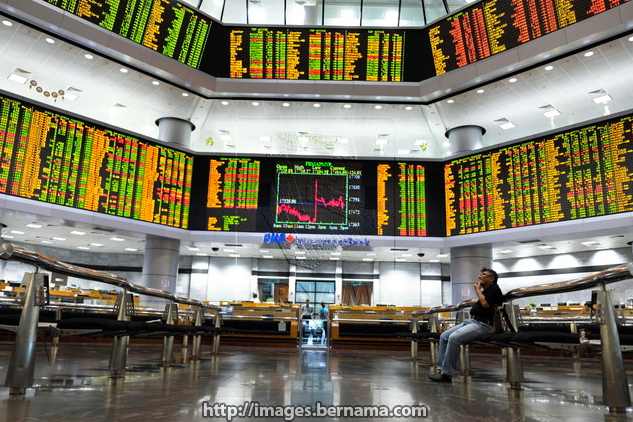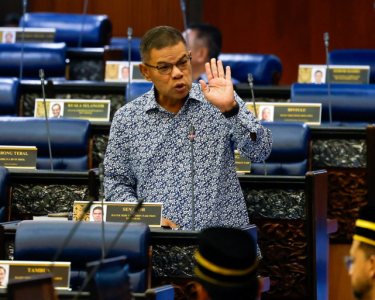
KUALA LUMPUR (March 29): Foreign institutions turned net sellers in the FBM KLCI between Monday and Thursday this week, with outflows amounting to RM146.53 million against inflows of RM90.18 million in the same period last week.
Bank Islam Malaysia Bhd chief economist Dr Mohd Afzanizam Abdul Rashid said global economic uncertainties, coupled with a moderate domestic economic outlook had triggered concerns among investors this week to opt for more stable markets.
“Externally, the inversion of yield curve in the US Treasury bonds has triggered concerns on a possible recession in the US. The spread between the 10-year yield and 3-month yield has been negative since last Friday and the prevailing spread currently stands at -1 basis points.
“This means the long-term rate is lower than the short-term rate, a situation known as yield inversion and typically results in an economic recession within 12 months to 27 months,” he told Bernama.
Mohd Afzanizam said the UK exit from the European Union (Brexit) is in limbo as Prime Minister Theresa May is no longer in control of the Brexit deal and similarly, the ongoing US-China trade discussion seems to be very fluid and fragile.
Meanwhile, back home, he said Bank Negara Malaysia’s (BNM) 2019 gross domestic product outlook of between 4.3 percent and 4.8 percent suggested that downside risks to growth are rising, while the range forecast for inflation of 0.7 percent to 1.7 percent indicates the central bank has policy space available to reduce the overnight policy rate this year.
“All in all, risk aversion sentiments have gone up and naturally, investors will shy away from risky assets like equities and seek protection in the fixed-income markets.
“Going forward, the equity market will remain volatile and we believe the market will closely monitor the various purchasing managers’ index in order to see business sentiments across the globe.
“There will be US job market reports such as the non-farm payroll and unemployment rate. So, we think the market will be very cautious next week,” he added.
During the week, Bursa Malaysia traded mostly lower, in line with its regional peers, due to uncertainties in global and domestic economic environment, including a series of weak economic data from the US.
On the local currency’s performance, FXTM research analyst Lukman Otunuga said the ringgit did not have the best trading week due to the greenback’s recovery.
However, he said the ringgit was not alone, as many other emerging market currencies were pressured by the strength of the US dollar, global growth fears and developments in Turkey.
“While the improving sentiment towards the Malaysian economy is likely to support the ringgit, upside gains remain threatened by external drivers.
“In regards to the technical picture, the ringgit remains in a position of power against the US dollar on the daily charts. The US dollar-ringgit rate has the potential to resume its downtrend if prices can trade back below 4.060,” he said.
On Friday, the ringgit ended at 4.0800/0850 against the US dollar compared with 4.0600/0650 last Friday, while the benchmark FTSE Bursa Malaysia KLCI closed at 1,643.63 points compared with 1,666.66 last week.
Among major events hogging the highlights during the week was BNM’s 2018 annual report briefing.
During the briefing, BNM governor Datuk Nor Shamsiah Mohd Yunus allayed growing concerns that Malaysia was facing deflation which resulted from a drop in the consumer price index (CPI) over the last two consecutive months.
She said the drop in the CPI was solely due to lower domestic fuel prices.
The central bank also announced further liberalisation in the foreign exchange administration (FEA) framework which is aimed at providing greater hedging flexibility for residents to better manage their foreign exchange risks.
Effective immediately, BNM said the framework would allow residents to hedge their foreign currency obligations for a longer tenure — extended to 12 months — to facilitate efficient financial planning by businesses.
The other major events that took place in the week were the Langkawi International Maritime and Aerospace 2019 (LIMA’19) exhibition and Permodalan Nasional Bhd’s 2018 financial review briefing.
During LIMA’19, International Trade and Industry Minister Datuk Darell Leiking said the government aimed to generate up to RM16 billion in revenue from the aerospace industry this year.
He said this would be driven by the vibrant and thriving aerospace industry in the Asia-Pacific region, which is expected to have the highest growth in new aircraft delivery for the next decade.





